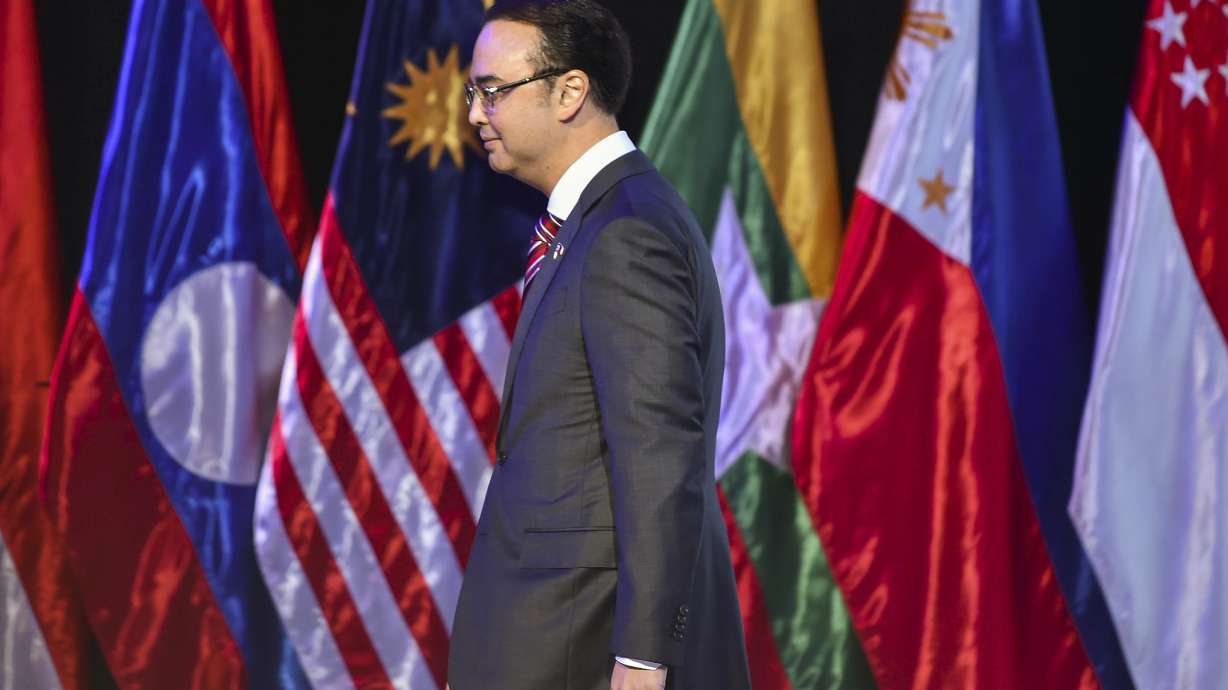Estimated read time: 3-4 minutes
This archived news story is available only for your personal, non-commercial use. Information in the story may be outdated or superseded by additional information. Reading or replaying the story in its archived form does not constitute a republication of the story.
MANILA, Philippines (AP) — Southeast Asia's top diplomats slammed North Korea with a sharp rebuke Saturday over its intercontinental ballistic missile tests and admonished Pyongyang to comply with its duty of helping avert conflicts as a member of Asia's biggest security forum.
The Association of Southeast Asian Nations foreign ministers, however, were split on an American proposal to suspend Pyongyang from the ASEAN Regional Forum, a 27-nation bloc that includes North Korea and its bitter adversaries the U.S., South Korea and Japan.
The ASEAN ministers reiterated in a joint statement their grave concerns over the escalation of tensions on the Korean Peninsula due to the North's two ICBM tests last month, saying the launches threaten world stability. The ministers traditionally issue a communique containing their diverse concerns, and their issuance of a separate statement on North Korea's missile tests and nuclear weapons program reflects their deep worries about the issue.
"These developments seriously threaten peace, security and stability in the region and the world," the ministers said in their statement. They urged the North to immediately and fully comply with its obligations under U.N. Security Council resolutions.
They also backed efforts to improve relations between the two Koreas and said their 10-nation bloc was ready "to play a constructive role in contributing to peace and stability" on the Korean Peninsula.
All the countries involved in the so-called six-party talks aimed at taming the North's nuclear ambitions belong to the ASEAN Regional Forum, but Philippine Department of Foreign Affairs spokesman Robespierre Bolivar said at a news conference Saturday that there was no plan for those nations to meet on the sidelines of the Manila meetings. North Korea pulled out of the talks — which also include South Korea, the U.S., China, Japan and Russia — in 2009 to protest international condemnation of a long-range rocket launch.
Philippine Foreign Secretary Alan Peter Cayetano said the ministers were divided over a U.S. proposal to suspend the North from the ASEAN Regional Forum, which will hold its annual meeting on Monday.
North Korean Foreign Minister Ri Yong Ho will attend Monday's meeting. With the U.S., Japan and South Korea expected to push for stronger actions against the North, a verbal showdown looms.
"There were views that, 'How can we hear them out or confront them if they're not there?' But there's also a view that we should give them an ultimatum," Cayetano said late Friday after discussing the issue with other foreign ministers.
The ministers "strongly call upon" North Korea, as a member of the ASEAN Regional Forum, to help "maintain the Asia Pacific as a region of lasting peace, stability, friendship and prosperity," the ministers said in their statement.
On the territorial disputes in the South China Sea that embroil ASEAN members Brunei, Malaysia, the Philippines and Vietnam, the 10 foreign ministers on Saturday approved a framework of a long-proposed code of conduct aimed at preventing clashes in the disputed waters, Bolivar said.
The Philippines, which serves as ASEAN chairman this year, called the conclusion of talks between China and ASEAN to finalize the framework "a very big step." Critics, however, say the framework serves only as a brief outline of previously agreed principles and fails to mention concerns over China's newly built islands or an arbitration ruling last year that invalidated Beijing's claims to virtually all of the South China Sea. China has refused to recognize the ruling, based on a 1982 maritime treaty.
A final copy of the framework seen by The Associated Press also did not mention whether the code should be legally binding, which most ASEAN states demand but China opposes, or the extent of disputed areas to be covered by such a code. The code will not serve as a tool to settle territorial disputes, according to the framework.
Copyright © The Associated Press. All rights reserved. This material may not be published, broadcast, rewritten or redistributed.









